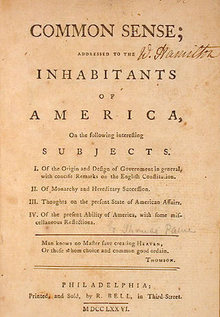|
The topic of our April 17 discussion was After the Revolution, with a focus on the long-term success or failure of revolutions around the world, including our own. The cover of our packet had a quote from The Future of Democracy about the French Revolution, although it applies to many others since that time:
We focused on the book Our Revolution by Bernie Sanders, as well as Thomas Paine by Craig Nelson, and Creating a Culture of Revolution, by our own Deborah Pearl. What revolutions have in common is radical change in an established political system. They can, however — as Deborah Pearl points out — be preceded by many years of ferment and discontent. In the case of Russia, there was the gradual organization of revolutionary ideas for 50 years before their revolution took place. Meetings were organized by intellectuals who used pamphlets to convince a growing percent of the population that they did not have to submit to the rule of “Father Czar” although they had become accustomed to suppression as a way of life over generations. Bernie Sanders, in his book Our Revolution, is not advocating an overthrow of government, but promoting a radical alteration in the economic situation that has left millions of members of the middle class behind. His book covers a wide range of areas that affect the majority of individuals including income and wealth inequality, climate change, trade agreements, wages, campaign finance reform, universal health care, protecting our most vulnerable citizens, and investing in a free education as a tool to move low-income individuals up the economic scale.  At the beginning of the American Revolution Thomas Paine wrote pamphlets that were widely popular and brought many people to the side of the resurrection, although the population was evenly split between those remaining loyal to Britain and those who advocated overthrowing its rule. “Common Sense” was the first of his popular tracts that ignited a sense of patriotic fervor among colonists: “The cause of America is, in great measure, the cause of all mankind…” According to his biographers, Paine was a passionate individual who lacked the tact and ability to work with others toward a common goal as was Jefferson or Franklin. The enlightenment that inspired our revolution was, to a great extent, an extension of the idea that humans were not bound by the traditions that kept them in their place, but only by the laws of a god who created nature. All are equal under that god. We discussed how in the aftermath of the American Revolution, the US founders realized that their Articles of Confederation had created a weak system of states with no common purpose or direction. Thus, eleven years later (1787) they saw the need to work together to create a written constitution that claimed that the authority for all laws as “We the People.” The majority of revolutions since that time have faltered in the long-term — despite written constitutions that guarantee democracy — because of a failure to establish a common direction based on a commitment to the welfare of the vast majority of people. This has included France (until recently), Russia, China, and Turkey, plus many countries in the Middle East and South and Central America. It also includes internal revolutions such as that in the US in the 1960s and movements like Occupy Wall Street. Our goal is to identify the principles of democracy that allow it to thrive in the long run so that revolutions are not subverted by the return of the oppression they were intended to eliminate. Our focus of our next meeting will be Economics and Democracy. We will explore what economists tell us about how to make democracy viable and explore the view that there is no such thing as “pure economics.” Despite claims of objectivity all major economists have a political view behind their theories. We will focus on the seminal work of Milton Friedman, Capitalism and Freedom, who famously stated: “Government is the problem,” echoed by a US President who claimed to eliminate the excesses of government while turning the US from a creditor to a debtor nation. We will contrast his views with those of Robert Reich in his most recent book, Saving Capitalism, and other influential economists. Our next meeting will be Monday, May 15 at 7:30. Let us know if you need the location or directions. Please recommend this newsletter and blog to people who you think might appreciate it. If you want to be added to the list to be notified when a new newsletter is posted, fill out our contact form and check the box just above the SUBMIT button. You may also use that form to be removed from our list. The Future of Democracy can be ordered wherever books are sold. Click ↓ (#) Comments below to view comments/questions or add yours. Click Reply below to respond to an existing comment.
0 Comments
Your comment will be posted after it is approved.
Leave a Reply. |
 5th edition now available 5th edition now available
Steve ZolnoSteve Zolno is the author of the book The Future of Democracy and several related titles. He graduated from Shimer College with a Bachelor’s Degree in Social Sciences and holds a Master’s in Educational Psychology from Sonoma State University. He is a Management and Educational Consultant in the San Francisco Bay Area and has been conducting seminars on democracy since 2006. Archives
July 2024
Categories |
 RSS Feed
RSS Feed